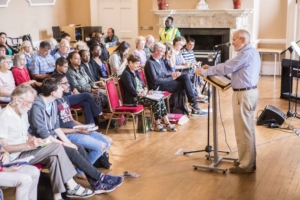 There are many types of theologies that may be summed up with one-word definitions, which have been useful to communicate fairly succinctly a whole volume of concepts. These are immediately understood by professional theologians and those who are well-read in theological studies. However, this description of what we believe and promote is hopefully understandable by anyone even if starting from zero in theological enquiry or study – so words like Protestant, Arminian, Evangelical and Charismatic may have communicated a lot to some, but less to others, and so fuller statements are used to explain what we believe.
There are many types of theologies that may be summed up with one-word definitions, which have been useful to communicate fairly succinctly a whole volume of concepts. These are immediately understood by professional theologians and those who are well-read in theological studies. However, this description of what we believe and promote is hopefully understandable by anyone even if starting from zero in theological enquiry or study – so words like Protestant, Arminian, Evangelical and Charismatic may have communicated a lot to some, but less to others, and so fuller statements are used to explain what we believe.
We in Ichthus are evangelicals and what we do and believe comes from our adherence and obedience to the Bible, as well as our understanding of our Lord – He is our Biblical Christ, the Messiah, Saviour and Teacher as seen in the Bible.
However, because the Bible itself says it was inspired by the Holy Spirit, it is necessary to ask the Spirit of God to help us understand where there are passages very hard to understand, or which appear to contradict each other. A humble spirit in the reader who prays, will find the Holy Spirit’s meaning and power. Some of the new Christian denominations began to see God’s power by His Spirit and so discovered the gifts of the Spirit, e.g. prophecy, word of knowledge, word of wisdom, tongues, interpretation of tongues, healings etc. This new move was called Charismatic. We in Ichthus are Evangelical Charismatics. Some Charismatics are also called Pentecostalists, an earlier name for those using the gifts or manifestations of the Spirit.
The whole of Christ’s church is expected to share by faith in this movement of salvation by love, prayer, worship, witness and holiness – i.e. growing in Christ-likeness and by our unity as Christ’s body sharing Christ’s life together in love and doing good to all men, especially the people of faith, Gal 6:10.
As a Fellowship in the Body of Christ, i.e. all believers born of God and filled with His Spirit, or all who name the Lord Jesus Christ as their Saviour and Lord, we are here to express our unity of love by serving and speaking well of all those in Christ’s family. This is sometimes called ecumenism, and as a church we belong to the Evangelical Alliance and Churches Together in England.
Finally, we are Trinitarian, worshiping God our Father as revealed in His Son Jesus Christ who is revealed and made known to us in our experience by the Holy Spirit, with a destiny to become like Jesus and to be with God.
So we could be called, in the light of this quick summary, an Evangelical, Charismatic, Witnessing, Worshiping, Open-Hearted, Trinitarian Church!
Until the 16th century Reformation, although there had been and still were many bodies of true believers in Jesus Christ, the dominant denomination was named Roman Catholic. Its HQ was the Vatican in Rome, it’s name meant ‘worldwide’ and its institution joined usually with the secular leaders of the nations. They dominated and governed all of Europe and thus were very powerful and corrupt. It was, and still is, a fact of history that “power corrupts and absolute power corrupts absolutely”. This led many leaders in Christianity to seek to reform the morals and lifestyles of much that was passing as Christian; and the Reformation began to clean up and brush up what was being accepted and promoted as the message (theology) of Jesus Christ. So groups of protest sprung up all over Europe opposing the status quo. Sadly violence was used instead of prayer to get things back to the earlier order. The well-known ‘Sir Thomas More’ (statue on the Thames Embankment) was an enthusiastic persecutor of the new churches who claimed the Bible was their authority, not the Pope living in Rome. No doubt Thomas More was sincere and thought that many churches instead of one (i.e. Roman Catholic) would weaken Christianity and so he particularly hunted down Bible translators such as Tyndale, calling them Evangelicals and putting them to death. So the word has stuck and until today those who claim to follow the Bible (called Protestants at the time because they protested against Rome) are still called Evangelicals.
